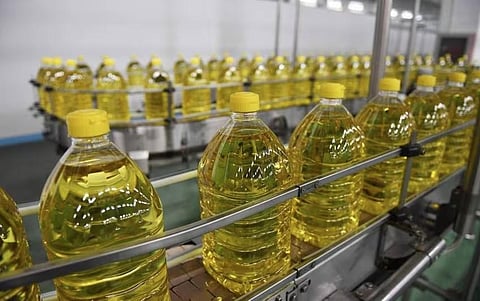

NEW DELHI: Edible oil industry body SEA has expressed concern that the rise in imports of refined palm oil is affecting domestic refiners and demanded that the government should increase the duty differential between crude and refined palm oil to 15 per cent from 7.5 per cent to check inward shipments.
India is a major importer of cooking oil to meet domestic demand. The country imports palm oil from Malaysia and Indonesia, while soyabean oil from Argentina and Brazil.
Among palm oils, the import of RBD Palmolein increased to 21.1 lakh tonnes in the 2022-23 marketing year (November to October) from 18.4 lakh tonnes in the previous year.
Crude palm oil (CPO) imports rose to 75.9 lakh tonnes in 2022-23 marketing year from 54.9 lakh tonnes in the year-ago period.
In a letter to its members, Solvent Extractors' Association of India (SEA) President Ajay Jhunjhunwala pointed out that Indian vegetable oil (comprising of edible and non-edible oil) refining industry is "facing challenges".
"The Indian edible oil Industry, with a size of Rs 3 lakh crore (USD 35 billion), holds significant importance. Over the last 12 years, Indonesia and Malaysia have imposed higher export taxes on CPO compared to refined oil to protect their refining industry. This has made refined oil cheaper, rendering Indian capacity redundant and unutilized," he said.
In India, the duty differential between CPO and refined palm oil has been reduced to 7.5 per cent, "serving the interests of the refining industry in Malaysia and Indonesia", Jhunjhunwala said.
He pointed out that the low-duty differential is negatively impacting the domestic vegetable oil refining industry.
"In light of this, SEA has once again appealed to the government to raise the duty difference from 7.5 per cent to 15 per cent between crude and refined palm oil," Jhunjhunwala said.
The SEA president said that India's imports of vegetable oils reached an all-time high of 167.1 lakh tonnes during the recently concluded 2022-23 oil year (November-October), with edible oil shipments hitting a record high of 164.7 lakh tonnes.
"The palm oil segment accounted for almost 60 per cent of imports. The landed prices of RBD palmolein are lesser than CPO due to exporting countries imposing higher export tax-cess on raw materials. This situation poses a significant threat to the profitability and viability of our refining industry, with many units now functioning solely as packers," he said.
Jhunjhunwala said this scenario is undesirable as it could lead to an increase in Non-Performing Assets (NPA) for supporting banks and shareholders, along with heightened unemployment in the industry and the value chain.
The president also expressed concern over the ban on exports of deoiled ricebran.
"The ban negatively affects solvent extraction, without serving its intended purpose of reducing dairy costs as deoiled ricebran price has least impact on milk and dairy prices," he said.
Jhunjhunwala said the price of deoiled ricebran has sharply dropped to nearly Rs. 13,500 per tonne from Rs 18,000 per tonne in August 2023.
"SEA strongly urges the concerned ministries not to extend the ban on DORB exports beyond end November 2023. We will also be meeting the concerned Ministers and senior officials in the coming days, hoping for a positive outcome," he told the members of the associations.